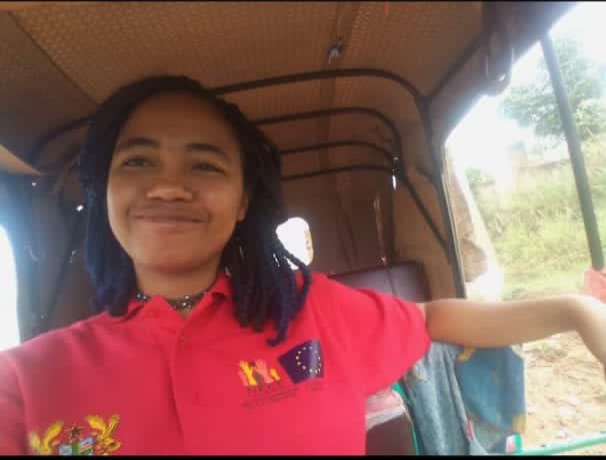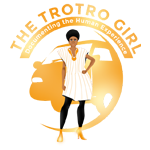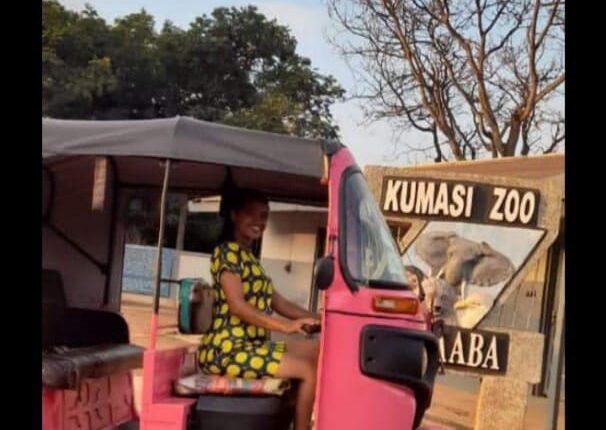The female `pragia` rider in Kumasi
Some call it yellow yellow, Pragia, Mahama Camboo, you name it. Tricycles have become a means of transport for many, providing jobs to riders and easy, cheaper transportation to commuters. While the majority of riders are men, especially young men, we hardly see women in the business. Therefore, to have a lady ride a tricycle as her ‘private vehicle’ is something new in our context. Our portrait for today is that lady who broke the stereotype.
Amanda Mclean is a 29-year-old lady who lives in Kumasi with her mum and her brother’s family. She lives far from the main road. “I had to walk a long distance each day to and from the main bus stop”. The cost of transportation from her home to work each day too was getting more and more expensive. She first decided to buy a motorbike. Her family, however, was against it. So, she eventually went in for a tricycle aka pragia.
Yes I am Ashanti, a lady, and I can ride a pragia too.
When she made up her mind, she did not discuss it with her family. She asked around and met a Nigerian rider who taught her how to ride. Then, she bought it from him and had her license. In the first week he taught her how to change gears and how to turn. In the second week, he took her to town to learn how to overtake cars. He taught her how to drive on the sides and general navigation.
“I wanted something simple. I did not want to struggle with fuel and other issues with cars. Also, my brother has two children. So, I wanted something with which I could easily carry my family to church, go to work and live simply. The kids were always so excited to ride with me. Yet, my family was not in support of it. They wanted me to give it to a rider. My mum never joined except for once to church”.
She says with excitement, “I loved riding it. I really really loved riding it. It was green when I bought it but I changed the colour to pink. I also bought a new tarpaulin and made other changes to suit my taste.
People thought she was wasting an asset. They advised her to give it to a rider so that she could make money from operating it commercially. Sometimes, she was greeted with shocked faces at the fact that she is a lady riding a tricycle. However, the general response from the public was positive and encouraging. “Those who thought I rode it commercially often commended me. They made reference to the complains of other ladies that there are no jobs.

pragiaThe only thing was that most people thought I am from northern Ghana or from Nigeria. They did not expect an Ashanti lady like me to be riding a tricycle. My people can be quite proud and do not like to do certain things. One of such things is riding a tricycle which is not respected. It is seen as something for the zongo boys”. Therefore, having a lady ride it seemed to go against the norm. Although people around her thought she had stooped low, she wanted to break the stereotype. “Yes I am Ashanti, a lady, and I can ride a pragia too”.
“When I was parked where there were other tricycles, people came to me instead of others because they thought I would ride safely. Drivers were nice to me on the road and would allow me to overtake. Even at the market when I went to do my mum’s shopping, which was also one of my aims for buying the tricycle, people actually helped me find a spot to park. The love was massive!”
Although she rode it privately, she occasionally picked people on her way to work which earned her a few ‘coins’
She says that the perks of using a tricycle are the ability to turn easily and also go everywhere. The disadvantage is that people do not respect tricycles. “Even motorbikes are more respected”
I took my pragia…everywhere. I really love it
For now, she takes her brother’s kids for a ride from time to time but that’s about it. “When I was using it, I took my tricycle to the mall, to the zoo, everywhere. I took it everywhere. I really love it”
A few months ago, after she had used it for six months, her family made her give it out to a commercial rider. “He never brought sales, only complaints and ended up wrecking the machine”. Within a month of giving it out, she had to change tires, the steering and many different parts. “The losses incurred on the tricycle since the rider took over and his disrespect to my family and passengers made me park it. I don’t use it but I prefer it sitting at home to someone misusing it”.
Thank you, Amanda, for sharing your story with us.
There are so many issues we can raise from this one piece. We can talk about the barriers girls face in society and the limiting beliefs we literally inculcate in them especially when it comes to venturing into certain fields. We can consider the place of family in our life choices especially within the Ghanaian, African context. The challenge with hiring people to manage our businesses and even classism.
What did you learn? How can Amanda`s story inspire us to try something new?


Thank you 🙏🏿
So inspiring and well done
Thank you for reading and commenting too
Amanda is a brave young lady who could serve as an inspiration for many others
Thanks a lot, Charles.
And yes, I agree with you.